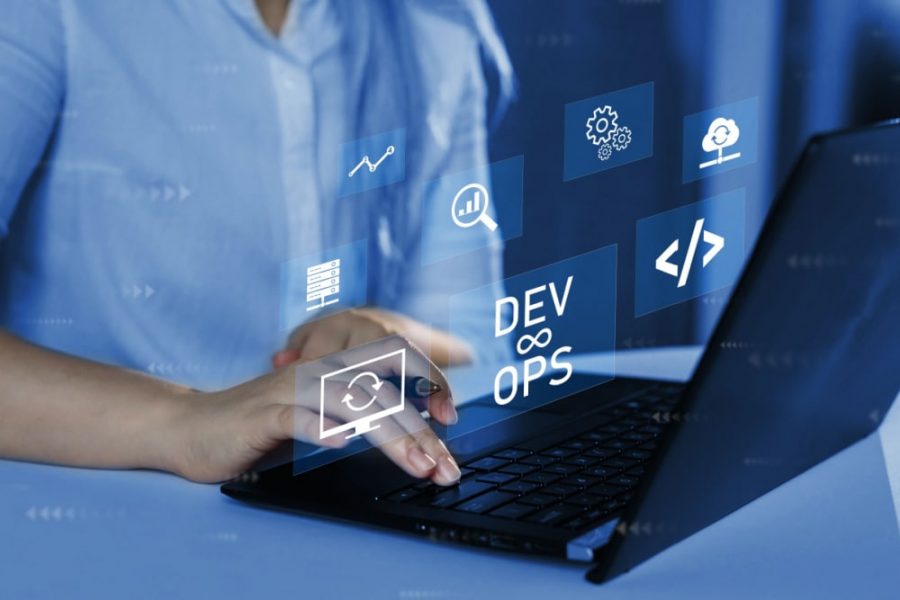
What is a DevOps Engineer?
- Builds and deploys applications by creating pipelines that automate the process of building, testing, and deploying code changes.
- Provisions and manages infrastructure through server, storage, and network setups and maintenance—the resources needed to run applications.
- Configures and manages operating systems to ensure smooth operation and security.
- Integrates security practices through software development processes to safeguard business operations.
- Advocates for business collaboration and continuous improvement through organization and constant system updates.
What are the Skills Needed for DevOps Engineers?
Becoming successful in this discipline requires mastering a diverse set of skills for DevOps Engineers. Some key areas to focus on are:
Technical Skills
- Coding: While not all DevOps roles require extensive coding, understanding programming languages like Python, Ruby, and Bash scripting can be a valuable asset to you.
- Infrastructure Management: Knowledge of cloud platforms like Amazon Web Services, Mircosoft Azure, and Google Cloud Platform is generally sought-after. Plus, your familiarity with containerization technologies like Docker and Kubernetes can also be beneficial.
- Configuration Management Tools: Using tools like Ansible, Chef, and Puppet helps you automate infrastructure provisioning and configuration.
- Version Control Systems: Programs like Git are a popular and essential tool you can use to track code changes and collaborate effectively.
- Continuous Integration and Continuous Delivery (CI/CD): Your understanding of CI/CD pipelines through tools like Jenkins is crucial when automating the software delivery process.

Soft Skills
- Communication: As an acting bridge among business processes, your skills in communication across technical and non-technical teams are critical for successful collaboration.
- Problem-Solving: As a DevOps engineer, you encounter challenges regularly. Strong problem-solving skills are a must to identify and resolve issues efficiently.
- Adaptability: The constant developments in tech mean IT continuously changes. So, as a professional in this field, you need to be adaptable and embrace new tools and technologies.
- Teamwork: DevOps is a team-oriented field, therefore your ability to work effectively with colleagues and collaborate on projects is essential.
By mastering both your technical and soft skills in DevOps, you’ll be well-equipped to thrive as a DevOps engineer. Utilizing these skills allows you to build your expertise in managing development and operations teams, ensuring seamless collaboration for smooth software delivery.
How Can You Become a DevOps Engineer?
To become a DevOps engineer in the Philippines, there a several paths you can take:
1. Earn a Relevant Degree
While this is optional, obtaining a bachelor’s or master of science degree in computer science, information technology, or software engineering can provide you with a strong foundation for a career in DevOps. Earning a related degree can get your foot in the door as you pursue this profession.
2. Develop Your Coding Skills
As you study, begin by learning basic programming languages and then progress to scripting languages. Taking online computer short courses in the Philippines, coding bootcamps, or even engaging in a bit of self-study can help you build your coding competence.
3. Learn Essential DevOps Tools

4. Gain Practical Experience and Build Your Portfolio
At the beginning of your career, look for internships or entry-level roles in IT support, system administration, or software development. These positions provide valuable hands-on experience you can leverage as your career progresses.
And as you gain work experience, be sure to save and compile your work in a portfolio. This provides you with copies of your project accomplishments, highlighting your coding projects and knowledge of DevOps tools.
5. Pursue Industry Certifications
6. Network with Professionals
Connect with other DevOps engineers through online communities, meetups, or industry events. Networking lets you learn from experienced professionals and potentially find job opportunities.
7. Enroll in Postgraduate Programs
Institutes like OEd Postgrad offer postgraduate programs specifically designed to equip you with the necessary skills and knowledge to excel as a DevOps engineer. These courses often combine theoretical knowledge with practical application, preparing you for the real-world demands of the role.
While there is no one-track way to become successful in DevOps, following this guide combined with your dedication and commitment to continuous learning can launch your career as an engineer in the Philippines.

Pursuing a Career as a DevOps Engineer with OEd Postgrad
Generally, careers in IT are preferred in various industries as their insights greatly benefit and influence business operations. And with a strong demand for skilled DevOps engineers specifically, leveraging further education can greatly boost the job opportunities available to you.
With that said, consider partnering with OEd Postgrad to fast-track your career in DevOps. Our comprehensive curriculum combined with the flexibility of our learning programs enables you to continue your studies as you pursue your career.
So, what are you waiting for? Take a step towards success in DevOps and contact us to learn more about how we can help you!
